Although investing in Monzo Bank may not be a possibility today, there are several other alternatives that we will present and discuss in the article that follows. We understand that picking and trading stocks is often a daunting task, especially for beginners. This guide has been developed to help you in your stock trading and your investing endeavors.
YOUR CAPITAL IS AT RISK
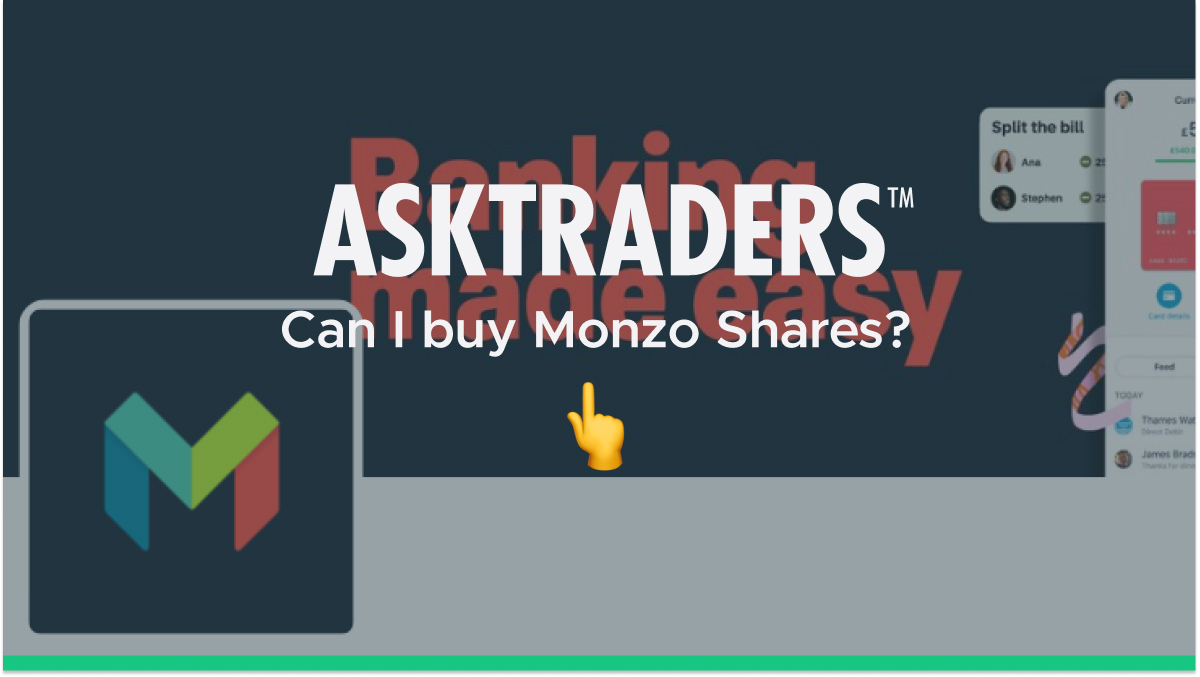
The financial press can often focus a great deal on a specific sector, which can mean opportunities for gain are preeminent for both new and experienced investors. Recently, there has been a host of articles on the topic of Monzo Bank and its competitors, and you may have asked yourself whether you should invest in this entity.
So, can one invest in Monzo Bank or its competitors in the UK? Unfortunately, Monzo Bank and most of its similarly-focused companies are not publicly traded entities. This means that you cannot buy shares in these firms. However, there are other opportunities to look out for instead.
Monzo and its fellows are demonstrating that innovation and convenience can ignite an industry, lead to profitable growth, and offer a chance to record a healthy return on investment. The heavy regulations of the banking sector inhibits a fast growth scenario, but the Fintech (Financial Technology) industry is where opportunities lie.
Table of contents
Can you buy shares in Monzo Bank?
The challenger bank sector, where Monzo Bank sits, has risen in the UK. This has primarily happened in the last decade. Founded in 2015, Monzo Bank is an innovative banking institution that attempts to offer services through an Internet-based app, thereby eliminating the costly demands of maintaining physical branches, while also relying solely on transactional income for its livelihood. Its mission is literally to challenge the “Big 4” banking institutions in the UK: Barclays, HSBC, Lloyds, and the Royal Bank of Scotland.
This type of bank is a relatively new phenomenon on the banking scene, and it has targeted the younger demographic that prefers an app-based banking service. Investing in these entities is complicated. Shares for Monzo Bank are not traded on any public exchange, but the firm has pursued a rather unique funding strategy in previous capital raising campaigns. It has employed traditional venture capital concepts, but it has also allowed account holders of the bank to participate in several crowdfunding programs.
Monzo Bank – current company profile
In just over eight years, Monzo Bank has amassed over seven million customers. Its most recent funding round occurred in December of 2022 when the firm raised $500m. Analysts have placed a valuation on the bank of $4.5bn, by virtue of the number of shares sold.
The owners have not announced any further funding plans, either from capital venture funds or from crowdfunding exercises. There are also no plans for an Initial Public Offering (IPO). Despite the fact that company has yet to record a profit, the management team has stated that it expects to break even by the end of 2023.
Monzo Bank has achieved their success by solely relying upon its smartphone application, which is the delivery vehicle for each of the bank’s services. After the bank’s slow beginning in 2016 (following its necessary authorizations from the Prudential Regulation Authority and the Financial Conduct Authority), growth accelerated in 2017 when regulations permitted the bank to convert its prepaid cards to actual debit cards that are tied to individual banking accounts.
Monzo competes against several similar banking startups in the UK and has stated plans to expand beyond the UK borders, recently introducing banking abroad and offering currency transfers to its customers. Familiar names in its competitive space include such entities as Resolut, Starling, and Metro Bank. The latter is a blend of app-based and traditional concepts. It has 77 physical branches and went public in 2018. Unfortunately, Metro’s stock price has plummeted 96% since its IPO, which is a bad sign for the entire sector.
YOUR CAPITAL IS AT RISK
Who owns Monzo Bank?
The owners of Monzo Bank fall into three groupings: the founders, capital venture firms, and account holders who had bought shares in the bank during a crowdfunding campaign. Monzo Bank is a private company and its shares are not traded on any exchange.
The bank’s founders left a major competitor (Starling) to form this institution; they were determined to offer a better service than their previous employer. Seven million customers now have access to many more services than just a prepaid card, including debit and credit cards, loans, checking and saving accounts, low-cost payment transfer treasury services, and access to ATMs.
Monzo Bank’s list of capital venture and investment firms is also impressive – these include Thrive Capital, Passion Capital, Digital Ventures, Goodwater Capital, Novator, Kaiser, TED Capital, the Abu Dhabi Growth Fund, Coatue, and Alpha Wave Ventures. If an IPO is not on the cards, then it is very probable that these firms will persuade the bank’s management for it to be acquired by one of the “Big 4”, or by another global bank that has invested heavily in technology, like Bank of America.
Do not be disappointed if you cannot yet invest in Monzo Bank. It may be private, but there are ample investment opportunities in the Fintech sector. Many of these companies are stable, traded on a national exchange. Block, PayPal, Global Payments, Adyen, and Bank of America are five firms worthy of your consideration.
Block (SQ)
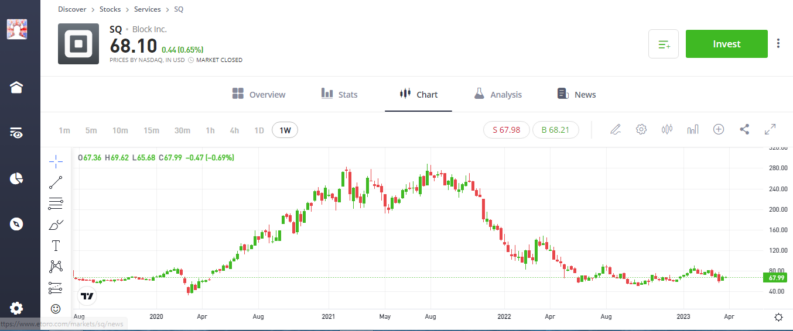
Experienced investors will recall that this company gained its reputation by supporting merchants through its branding as Square, but the company now goes by the name of Block. The “SQ” ticker symbol is a holdover from its past history. Block is not a bank, but it does own a banking subsidiary by the name of Square Financial Services. Like Monzo, it has excelled in its services through its use of smartphone technology.
Block has expanded its portfolio from simple deposit and transfer transactions to now include debit cards, buying and selling the popular cryptocurrency Bitcoin, blockchain integration, and an easy-to-use stock-trading platform. It has also recently announced the introduction of lending services via its acquisition of Afterpay. Although it began in the merchant-servicing space, it now also supports individuals. With nearly 50 million active users a month, Block’s transaction volume can only increase when the global economy rebounds.
Like other Fintech companies, stock prices rose sharply after initial Covid lockdowns, only to fall after investor exuberance drove prices beyond sustainable limits. The firm’s Cash App and merchant support platform, Square Online, are uniquely positioned for rapid future growth in e-commerce. One Truist analyst, Andrew Jeffret, recently reset his price target for $105 per share. SQ is currently trading around $68.
YOUR CAPITAL IS AT RISK
PayPal (PYPL)
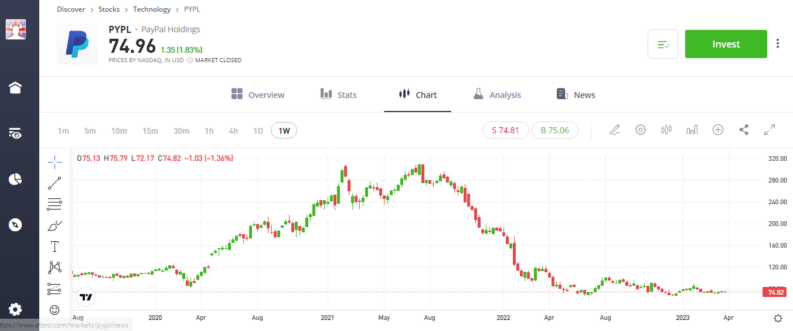
PayPal is a veteran leader in online payment transactions. More than twenty years ago, when banks were reluctant to guarantee online payments, PayPal stepped in to fill the void. Its person-to-person payment application, Venmo, has become both the standard and leader for this service, amassing 432 million active users in over 200 countries across the globe.
Although it is a well-established firm with modest growth forecasts of 7% per annum, PayPal has expanded its service, and is very adept at cross-selling its enormous customer base. It is also a highly profitable enterprise – so much so that it has accumulated $1.8bn in free cash flow. PayPal’s CFO announced that the firm will use a good deal of its capital to buy back stock, meaning that shareholders will receive an additional boost.
Global Payments (GPN)
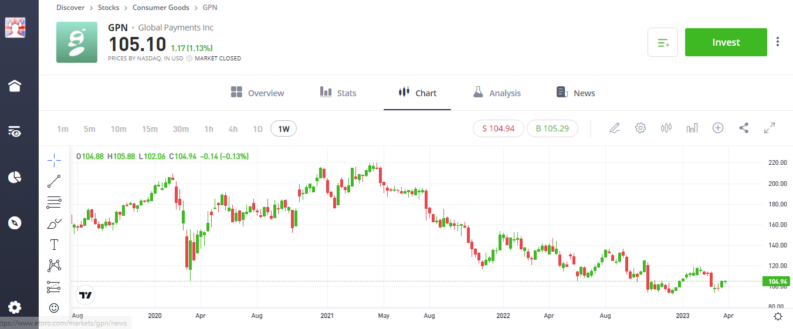
Global Payments is a major payment processor, but its stock has been knocked down. This is perhaps due to is divestiture of its Netspend subsidiary in August of 2022. With the exit of its consumer-based activity in Netspend, the firm can now focus on its core competency, which is processing payments for businesses. These services provide secure and reliable payment platforms, which excel in data security and fraud prevention.
Of sixteen analysts following this stock, half of them rate Global Payments a Strong Buy. Another three also rate it a Buy. These experts agree that the market has been more than unkind to the firm due to its Netspend spin-off. Price targets for these analysts range from $143 to $210 after the next 12 months. GPN currently trades at $105.
YOUR CAPITAL IS AT RISK
Adyen (ADYE.NV)
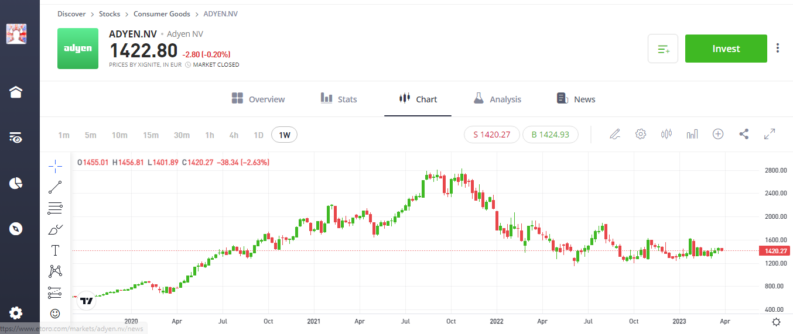
Adyen is also focused on the business payment sector of Fintech. It is a Netherlands-based company that operates around the world, although its presence in the US market is not well known. However, it does serve big businesses – think the likes of Microsoft, Uber, and McDonald’s.
It processes over $700bn in payment volume at a very profitable 59% EBITDA (Earnings-Before-Interest-Taxes-Depreciation-Amortization) margin. Average price target for 12 analysts in one year is $1,860 with a high of $2,529. It currently trades at $1,423.
Bank of America (BAC)
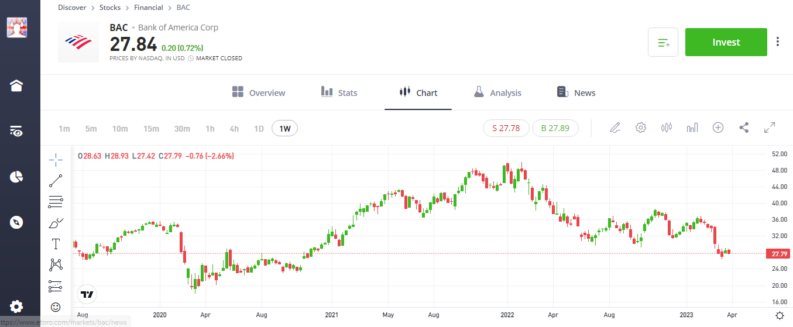
For those investors that like banks, Bank of America is one that has invested heavily in electronic infrastructure, which should prove beneficial going forward. Analysts are more than favorable in their forecasts, which is an affirmation that BAC has progressed beyond old-school banking. Of 12 Wall Street analysts, the average forecast a year out is $38 with a high of $48. BAC today trades at roughly $28 per share.
YOUR CAPITAL IS AT RISK
Investing in an index fund
Time has proven that anything can happen in any industry – to a single company within it, or even to a management team that has the ability to decimate a stock’s value. If you want to diversify your risk in the Fintech sector, there are several Exchange-Traded Funds (ETFs) which have broad-based stock portfolios. Many ETFs hold the very stocks discussed above and they attempt to emulate the returns in this technology arena. These ETFs are like index funds in that fees are low and returns can mimic sector averages.
Global X Fintech ETF (FINX)
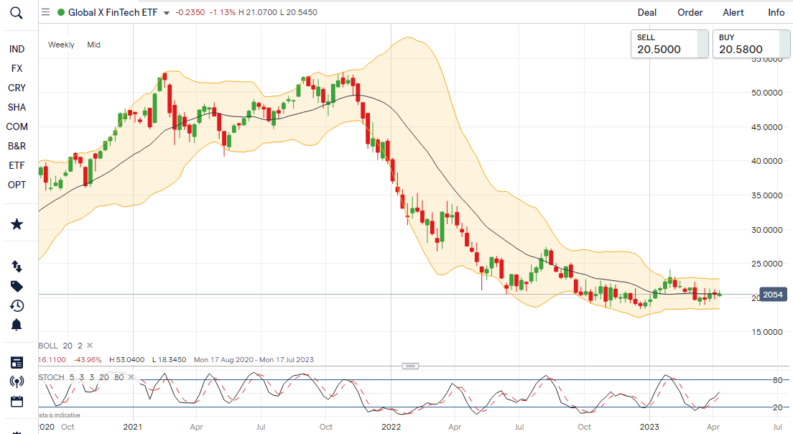
FINX is the oldest firm in this space and currently has over $1bn in assets under management. With FINX, your risk is diversified among 40 holdings for companies that generate the majority of revenue in the Fintech sector. Furthermore, you are positioned for a recovery in Fintech without the risk of choosing a handful of stocks.
Concluding remarks
Owning shares in Monzo Bank is complicated due to its status as a private entity. Large venture capital firms presently own the bank’s shares, but banking customers have been allowed to buy shares in previous crowdfunding campaigns. There have been no announced plans for a potential Initial Public Offering of shares. However, at some point, venture capital investors will press management for some type of exit strategy in which to redeem their investments.
Monzo Bank has achieved its success by pursuing a strategy of innovation and convenience, two factors that often lead to profitable investment gains. Although investing in Monzo Bank is precluded at this time, there are several other exciting investment possibilities in the Fintech industry that are worthy of your consideration. These include Block, PayPal, Global Payments, Adyen, and Bank of America. These firms are publicly traded on national exchanges, and they offer returns emblematic of the potential of the challenger bank sector. If you prefer a less risky approach, then investing in the Global X Fintech ETF may be the way to go.













